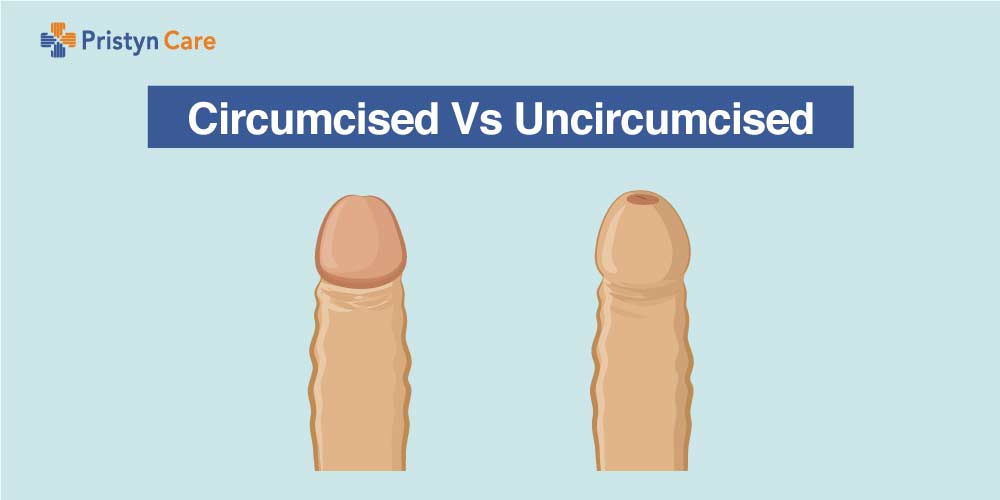![]() Views: 16,180
Views: 16,180
Circumcised Vs Uncircumcised
Males are born with a hood of skin that covers the head of their penis. This hood is called the foreskin. The surgical removal of this foreskin is called circumcision.
Dedicated Support at Every Step!
Our Doctors are available 24 hours a day, 7 days a week to help you!
Circumcision has been in practice as a religious ritual for hundreds of years. But over time, the medical and health benefits of circumcision have also come into the light.
Circumcision is a fairly common practice nowadays. According to a 2016 study, 37-39 percent of the males around the world are circumcised. Areas like the Middle East, South Korea, and the US have the highest rates of circumcision in the world. (Also Read: What is Circumcision?)
It is quite obvious that a circumcised penis will be different from an uncircumcised one. There are a number of areas in which these differences between circumcised and uncircumcised penis can be seen.
Table of Contents
Let’s now look at the differences between an uncircumcised and a circumcised penis:
Overall Appearance of the penis
In an uncircumcised penis, the foreskin covers the glans penis when the penis is flaccid. Upon erection, the foreskin of the penis retracts and the glans penis reveals.
On the other hand, in a circumcised penis, the glans penis is visible at all times, whether the penis is erect or not.
A minor difference may be seen in the skin texture in the circumcised penis.
Penis Size and Bulk
The size of the penis is based mainly on the genes and the blood flow to the penis. Since neither of these is affected by circumcision, the penis size upon erection is the same in both circumcised and uncircumcised penises.
However, an uncircumcised penis when flaccid may appear to be bulkier due to the presence of the foreskin.
No Cost EMI, Hassle-free Insurance Approval
Hygiene of the penis
It is quite obvious that it is more difficult to take care of an uncircumcised penis than a circumcised penis.
In an uncircumcised penis, dead cells, sweat and dirt can accumulate under the foreskin. This can even lead to the build-up of smegma and penile problems like balanitis, posthitis. Thus, more efforts need to be made to maintain the proper hygiene of an uncircumcised penis.
For a circumcised penis, however, maintaining hygiene is relatively easier. Just washing the penis while bathing is enough to maintain good hygiene.

Sexual Experience
Circumcision does not have any negative effects on sexual pleasure or sexual function. Most of the men who undergo circumcision do not report any change in the sensitivity of the penis after the procedure. Contrary to popular beliefs that circumcision makes sex less pleasurable, some men even say that their sexual pleasure was heightened after circumcision.
Also, circumcision can also solve the problem of premature ejaculation for some men. Circumcision is believed to make the man last longer and this can be more pleasurable for both you and your partner.

Sperm Production and Fertility
Production of sperms is the function of the testicles. The penis has no role to play in sperm production. Therefore, there is absolutely no difference in the sperm production and fertility of an uncircumcised and circumcised man.
Urinary tract Infections
Uncircumcised men are more prone to developing urinary tract infections than circumcised men. If you are uncircumcised, pathogens and urine can get retained under the foreskin and can lead to urinary tract infections.
On the other hand, in the case of a circumcised man, urine cannot get retained and pathogens can also not thrive for a long time. Hence, the risk of UTI’s is reduced in circumcised men.
Sexually Transmitted Infections
Circumcision also reduces the chance of developing sexually transmitted infections like HIV, syphilis, herpes, etc. Researches have revealed that the risk of HIV is reduced in circumcised men by about 50-60 percent. Similarly, circumcised men have a 30 percent lower chance of contracting herpes and HPV. (Also Read: How Circumcision Reduces The Risk Of Contracting HIV?)
Also, studies have shown that women with uncircumcised partners are more prone to cervical cancer than women with circumcised partners.
Penile Cancer and other problems
An uncircumcised man is more vulnerable to penile problems like phimosis, paraphimosis, and balanitis. This is due to the difficulty in maintaining the proper hygiene of the penis. Some of these conditions can even lead to permanent damage to the penis. For instance, paraphimosis can cause an obstruction in the blood flow of the penis and this can cause the death of penile tissues.
Also, it has been proven that circumcised men are less prone to penile cancer than uncircumcised men. Circumcision during infancy nearly eliminates the risk of penile cancer.
The Bottom Line
Being circumcised or uncircumcised is a personal choice. However, it is pretty clear that circumcision has a number of health and other benefits. Undergoing circumcision can help you prevent certain conditions. Preventing these conditions in an uncircumcised penis will take a lot of extra effort. And despite the preventive efforts, some conditions related to the foreskin can still arise.
So if you are suffering from any such condition, or if you want to eliminate the risk of developing certain penile problems permanently, you should consult a specialist doctor and if your doctor suggests, you should undergo circumcision.

Do not worry about the pain and bleeding, as the modern procedure of laser circumcision has these covered. Laser circumcision is a minimally invasive procedure that is being used widely nowadays. It involves minimal pain and no intraoperative bleeding. Laser circumcision does not have any risk of postoperative complications associated with it. It is an absolutely safe procedure with a high success rate.
If you are thinking about undergoing circumcision, laser circumcision is the best option for you. You can get in touch with Pristyn Care if you have any doubts or queries about the procedure and our medical coordinators will be happy to assist you.
Also Read:










